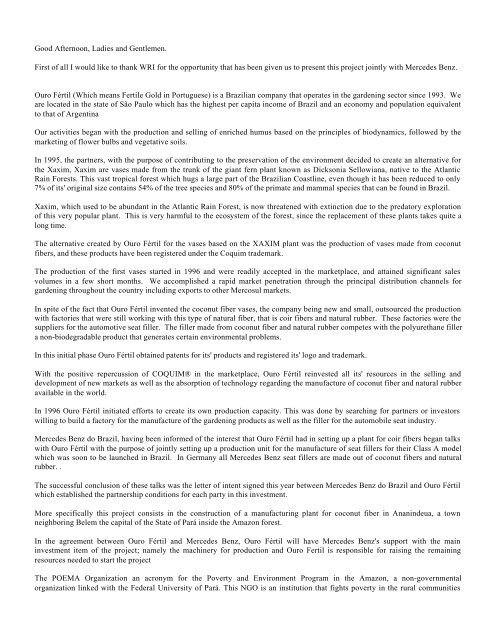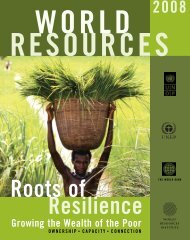Good Afternoon, Ladies and Gentlemen. - World Resources Institute
Good Afternoon, Ladies and Gentlemen. - World Resources Institute
Good Afternoon, Ladies and Gentlemen. - World Resources Institute
You also want an ePaper? Increase the reach of your titles
YUMPU automatically turns print PDFs into web optimized ePapers that Google loves.
<strong>Good</strong> <strong>Afternoon</strong>, <strong>Ladies</strong> <strong>and</strong> <strong>Gentlemen</strong>.<br />
First of all I would like to thank WRI for the opportunity that has been given us to present this project jointly with Mercedes Benz.<br />
Ouro Fértil (Which means Fertile Gold in Portuguese) is a Brazilian company that operates in the gardening sector since 1993. We<br />
are located in the state of São Paulo which has the highest per capita income of Brazil <strong>and</strong> an economy <strong>and</strong> population equivalent<br />
to that of Argentina<br />
Our activities began with the production <strong>and</strong> selling of enriched humus based on the principles of biodynamics, followed by the<br />
marketing of flower bulbs <strong>and</strong> vegetative soils.<br />
In 1995, the partners, with the purpose of contributing to the preservation of the environment decided to create an alternative for<br />
the Xaxim, Xaxim are vases made from the trunk of the giant fern plant known as Dicksonia Sellowiana, native to the Atlantic<br />
Rain Forests. This vast tropical forest which hugs a large part of the Brazilian Coastline, even though it has been reduced to only<br />
7% of its' original size contains 54% of the tree species <strong>and</strong> 80% of the primate <strong>and</strong> mammal species that can be found in Brazil.<br />
Xaxim, which used to be abundant in the Atlantic Rain Forest, is now threatened with extinction due to the predatory exploration<br />
of this very popular plant. This is very harmful to the ecosystem of the forest, since the replacement of these plants takes quite a<br />
long time.<br />
The alternative created by Ouro Fértil for the vases based on the XAXIM plant was the production of vases made from coconut<br />
fibers, <strong>and</strong> these products have been registered under the Coquim trademark.<br />
The production of the first vases started in 1996 <strong>and</strong> were readily accepted in the marketplace, <strong>and</strong> attained significant sales<br />
volumes in a few short months. We accomplished a rapid market penetration through the principal distribution channels for<br />
gardening throughout the country including exports to other Mercosul markets.<br />
In spite of the fact that Ouro Fértil invented the coconut fiber vases, the company being new <strong>and</strong> small, outsourced the production<br />
with factories that were still working with this type of natural fiber, that is coir fibers <strong>and</strong> natural rubber. These factories were the<br />
suppliers for the automotive seat filler. The filler made from coconut fiber <strong>and</strong> natural rubber competes with the polyurethane filler<br />
a non-biodegradable product that generates certain environmental problems.<br />
In this initial phase Ouro Fértil obtained patents for its' products <strong>and</strong> registered its' logo <strong>and</strong> trademark.<br />
With the positive repercussion of COQUIM® in the marketplace, Ouro Fértil reinvested all its' resources in the selling <strong>and</strong><br />
development of new markets as well as the absorption of technology regarding the manufacture of coconut fiber <strong>and</strong> natural rubber<br />
available in the world.<br />
In 1996 Ouro Fértil initiated efforts to create its own production capacity. This was done by searching for partners or investors<br />
willing to build a factory for the manufacture of the gardening products as well as the filler for the automobile seat industry.<br />
Mercedes Benz do Brazil, having been informed of the interest that Ouro Fértil had in setting up a plant for coir fibers began talks<br />
with Ouro Fértil with the purpose of jointly setting up a production unit for the manufacture of seat fillers for their Class A model<br />
which was soon to be launched in Brazil. In Germany all Mercedes Benz seat fillers are made out of coconut fibers <strong>and</strong> natural<br />
rubber. .<br />
The successful conclusion of these talks was the letter of intent signed this year between Mercedes Benz do Brazil <strong>and</strong> Ouro Fértil<br />
which established the partnership conditions for each party in this investment.<br />
More specifically this project consists in the construction of a manufacturing plant for coconut fiber in Ananindeua, a town<br />
neighboring Belem the capital of the State of Pará inside the Amazon forest.<br />
In the agreement between Ouro Fértil <strong>and</strong> Mercedes Benz, Ouro Fértil will have Mercedes Benz's support with the main<br />
investment item of the project; namely the machinery for production <strong>and</strong> Ouro Fertil is responsible for raising the remaining<br />
resources needed to start the project<br />
The POEMA Organization an acronym for the Poverty <strong>and</strong> Environment Program in the Amazon, a non-governmental<br />
organization linked with the Federal University of Pará. This NGO is an institution that fights poverty in the rural communities
located in the Amazon. This is done by creating income alternatives for the people of the Amazon region so that they can exploit<br />
the rural activities offered by the forest in a responsible <strong>and</strong> sustainable manner.<br />
One of the alternatives created by POEMA is the Self Sustaining Forest System or SAF as it is known locally, where the<br />
population of small communities are being trained to add value to the various native products of the forest, such as açaí, Pará nuts,<br />
curauá, látex <strong>and</strong> others. The coconut, in spite of it not being native to the area also enters this context with the project of a<br />
manufacturing plant in the Amazon, because the coconut will be utilized entirely, the pulp <strong>and</strong> water is sold to the food industry<br />
<strong>and</strong> the husk is utilized to make fiber bales to supply the factory. Even the powder, which is another product derived from the<br />
production process, will be sold in the gardening segment as fertilizer.<br />
POEMA therefore will be responsible for the development <strong>and</strong> training of the suppliers of the principal raw materials for this<br />
project, namely coconut fiber <strong>and</strong> natural rubber. These suppliers are the rural communities in the state of Pará (mainly located on<br />
the large isl<strong>and</strong> of Marajo at the Amazon Delta) which will be working with the coconuts <strong>and</strong> supplying the fibers, as well as the<br />
natural rubber of the Amazon for Ouro Fertil.<br />
CONCLUSIONS<br />
This project presents extremely positive <strong>and</strong> sustainable characteristics with regard to the environmental, social <strong>and</strong> economic<br />
aspects, which are.<br />
• The manufacture of environmentally friendly <strong>and</strong> correct products,<br />
• It combats the devastation of the Atlantic Rain Forest through the use of biologically renewable materials which substitutes an<br />
important plant of that ecosystem, the Xaxim faced with extinction with COQUIM which is based on coir fibers, <strong>and</strong> entirely<br />
renewable.<br />
• Substitutes the utilization of polyurethane foam with an organic product in the automotive industry.<br />
• Provides for the creation of income for the Amazonian population through sustainable <strong>and</strong> responsible alternatives.<br />
• Increases the awareness of these people with regard to the defense of the ecosystem in which they live, thereby protecting the<br />
Amazon Forest.<br />
• The creation of jobs <strong>and</strong> development in one of the poorest <strong>and</strong> least developed regions of Brazil, namely the state of Pará,<br />
• Motivates the participation of the local university through the POEMA program, in finding practical solutions for the<br />
Amazonian communities,<br />
• Joining a small Brazilian enterprise with a University <strong>and</strong> a large multinational in a socially <strong>and</strong> environmentally beneficial<br />
project, <strong>and</strong> above all economically sustainable.<br />
In support of global biodiversity the most important conclusion with regard to this project is the creation of direct <strong>and</strong> indirect<br />
mechanisms that protect two important forests in Brazil, the Atlantic Rain Forest, by preserving the giant ferns (xaxim) <strong>and</strong> the<br />
Amazon Forest with the increased awareness of its people with the development of economically sustainable activities that are not<br />
aggressive to the environment <strong>and</strong> which hopefully will make them the natural guardians <strong>and</strong> protectors of the Amazon Forest.<br />
Thank you very much for this opportunity <strong>and</strong> I will be available for any further questions that you may have.

















